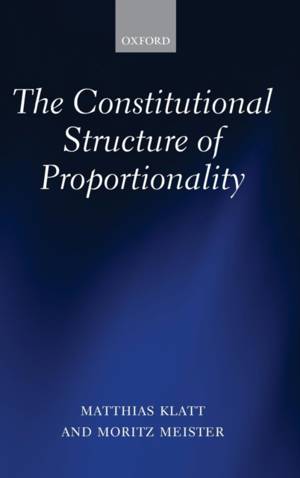
- Afhalen na 1 uur in een winkel met voorraad
- Gratis thuislevering in België vanaf € 30
- Ruim aanbod met 7 miljoen producten
- Afhalen na 1 uur in een winkel met voorraad
- Gratis thuislevering in België vanaf € 30
- Ruim aanbod met 7 miljoen producten
Zoeken
€ 186,45
+ 372 punten
Omschrijving
As constitutional law globalizes, the quest for a common grammar or 'generic constitutional law' becomes more pressing. Proportionality is one of the most prominent and controversial components of the modern, global constitutional discourse. In view of the alarming tension between the triumphant success of proportionality and the severity of the criticism directed towards it, this book offers an in-depth analysis of the critics of proportionality and demonstrates that their objections against the proportionality test are not convincing. It clarifies and further develops the current theories of proportionality and balancing.
Building upon on Robert Alexy's predominant principles theory, the book suggests several modifications to this theory. Drawing examples from the case law of the European Court of Human Rights, the European Court of Justice, and various national constitutional courts it illustrates the argument in favour of proportionality and demonstrates its relevance for deciding concrete cases.
Building upon on Robert Alexy's predominant principles theory, the book suggests several modifications to this theory. Drawing examples from the case law of the European Court of Human Rights, the European Court of Justice, and various national constitutional courts it illustrates the argument in favour of proportionality and demonstrates its relevance for deciding concrete cases.
Specificaties
Betrokkenen
- Auteur(s):
- Uitgeverij:
Inhoud
- Aantal bladzijden:
- 204
- Taal:
- Engels
Eigenschappen
- Productcode (EAN):
- 9780199662463
- Verschijningsdatum:
- 8/09/2012
- Uitvoering:
- Hardcover
- Formaat:
- Genaaid
- Afmetingen:
- 157 mm x 236 mm
- Gewicht:
- 476 g

Alleen bij Standaard Boekhandel
+ 372 punten op je klantenkaart van Standaard Boekhandel
Beoordelingen
We publiceren alleen reviews die voldoen aan de voorwaarden voor reviews. Bekijk onze voorwaarden voor reviews.







